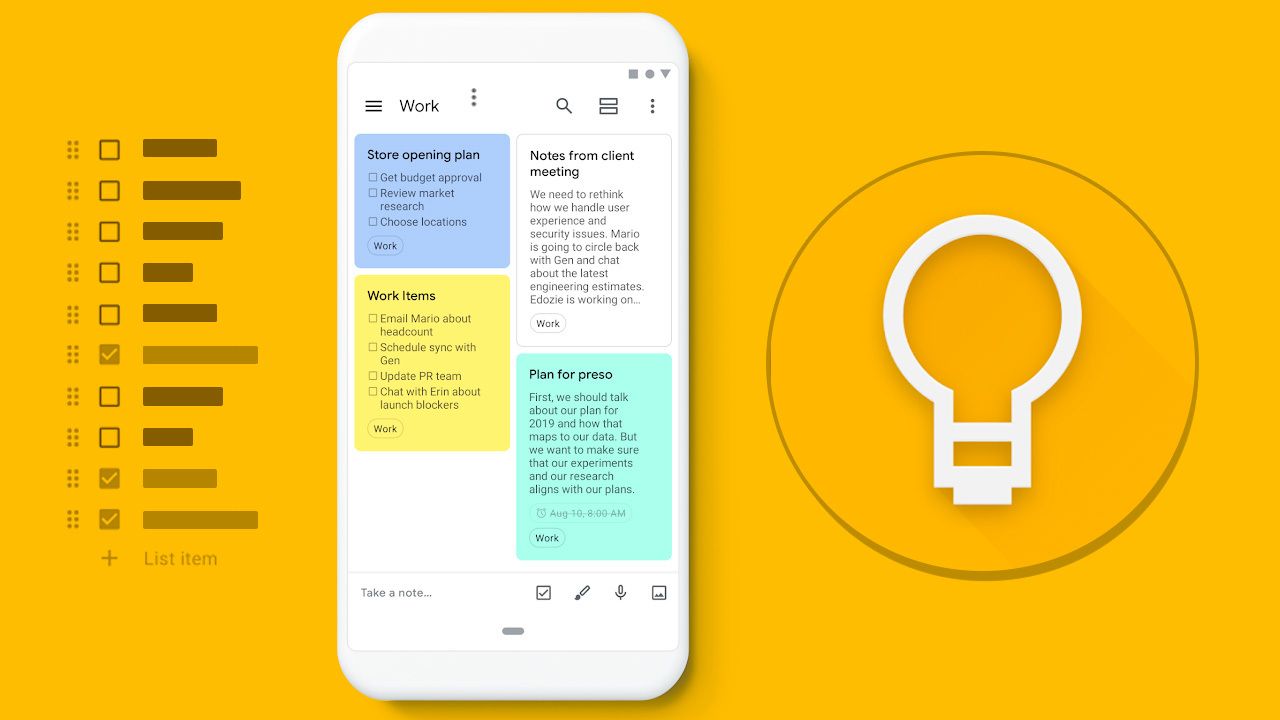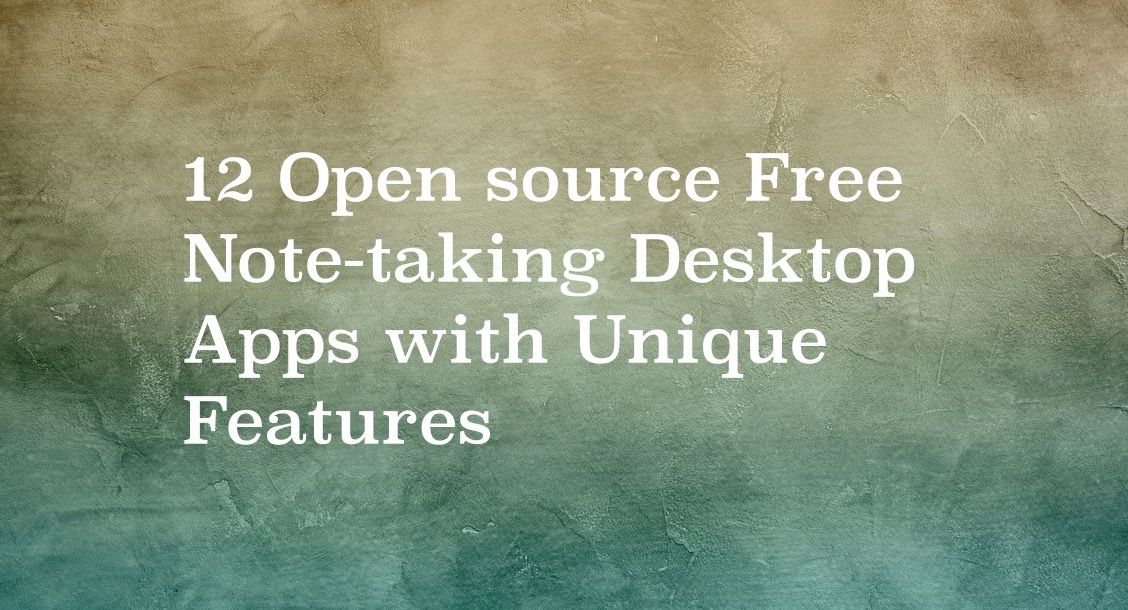25 Free Open-Source Self-hosted Note-Taking Apps, Sync Notes Across Desktop and Mobile to Boost Your Productivity
Are You Truly Ready to Put Your Mobile or Web App to the Test?
Don`t just assume your app works—ensure it`s flawless, secure, and user-friendly with expert testing. 🚀
Why Third-Party Testing is Essential for Your Application and Website?We are ready to test, evaluate and report your app, ERP system, or customer/ patients workflow
With a detailed report about all findings
Contact us nowTable of Content
In this long post, we dive into a curated selection of applications designed to enhance productivity.
These tools not only allow users to jot down thoughts and organize ideas efficiently but also ensure that their notes are accessible across various devices, fostering a seamless workflow whether at home, in the office, or on the go.
1- Plainpad

Plainpad is an open-source, self-hosted note-taking application that prioritizes simplicity and stability.
By running it on your own server, you have full control over your data and can access it from any internet-connected device.

2- Jotsy: Just your notes
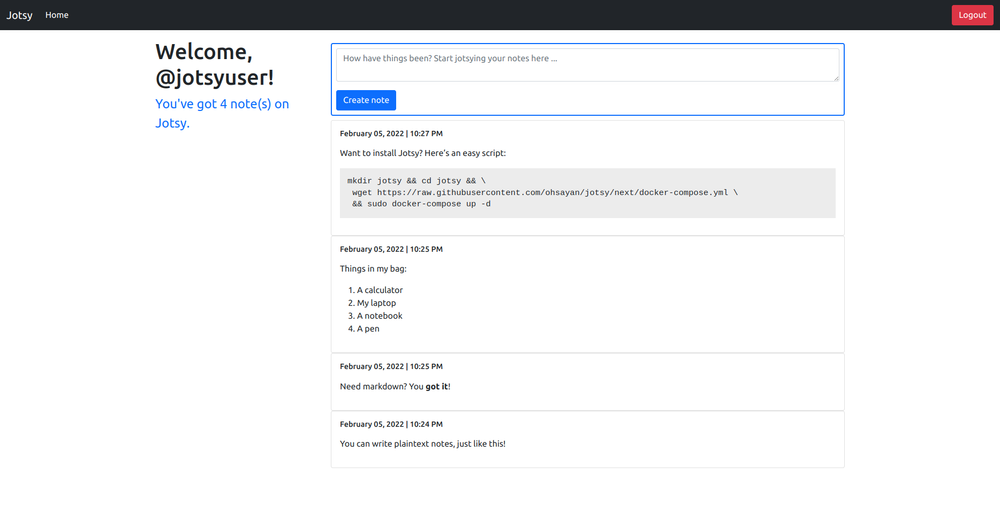
Jotsy is a self-hosted, free and open-source note-taking app that focuses on simplicity.
It offers features such as multi-user support, distraction-free note taking, plaintext or markdown options, secure authentication, and simple self-hosting.
Not that, this app is currently under active development.
3- OsmoNote
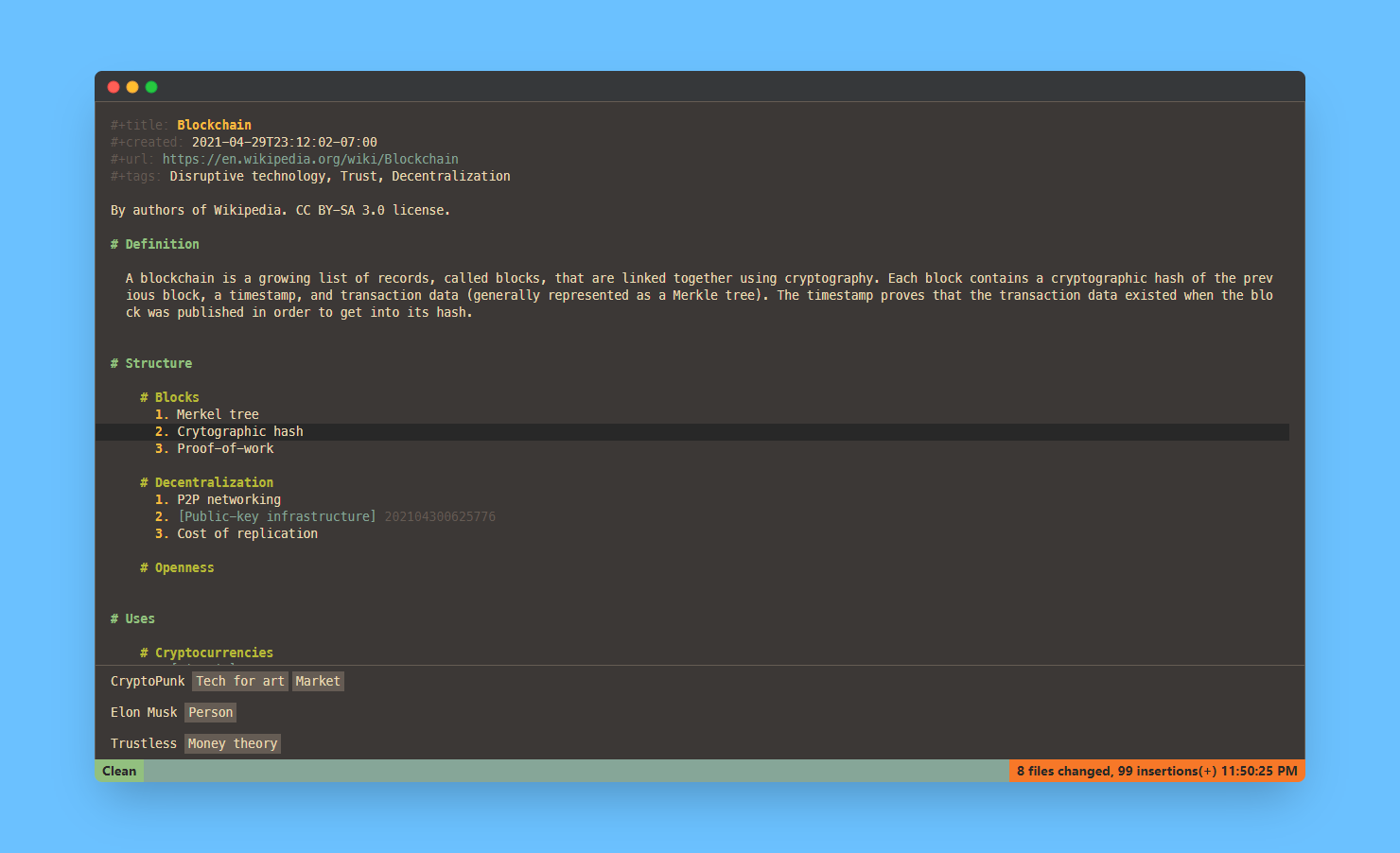
osmos::note is a self-hosted collaborative note app that offers fast full-text search, backlink traversal for serendipitous discovery, durable knowledge preservation with plaintext and Git backend, and a keyboard-centric design for maximum efficiency.

4- TakeNote (for Developers)
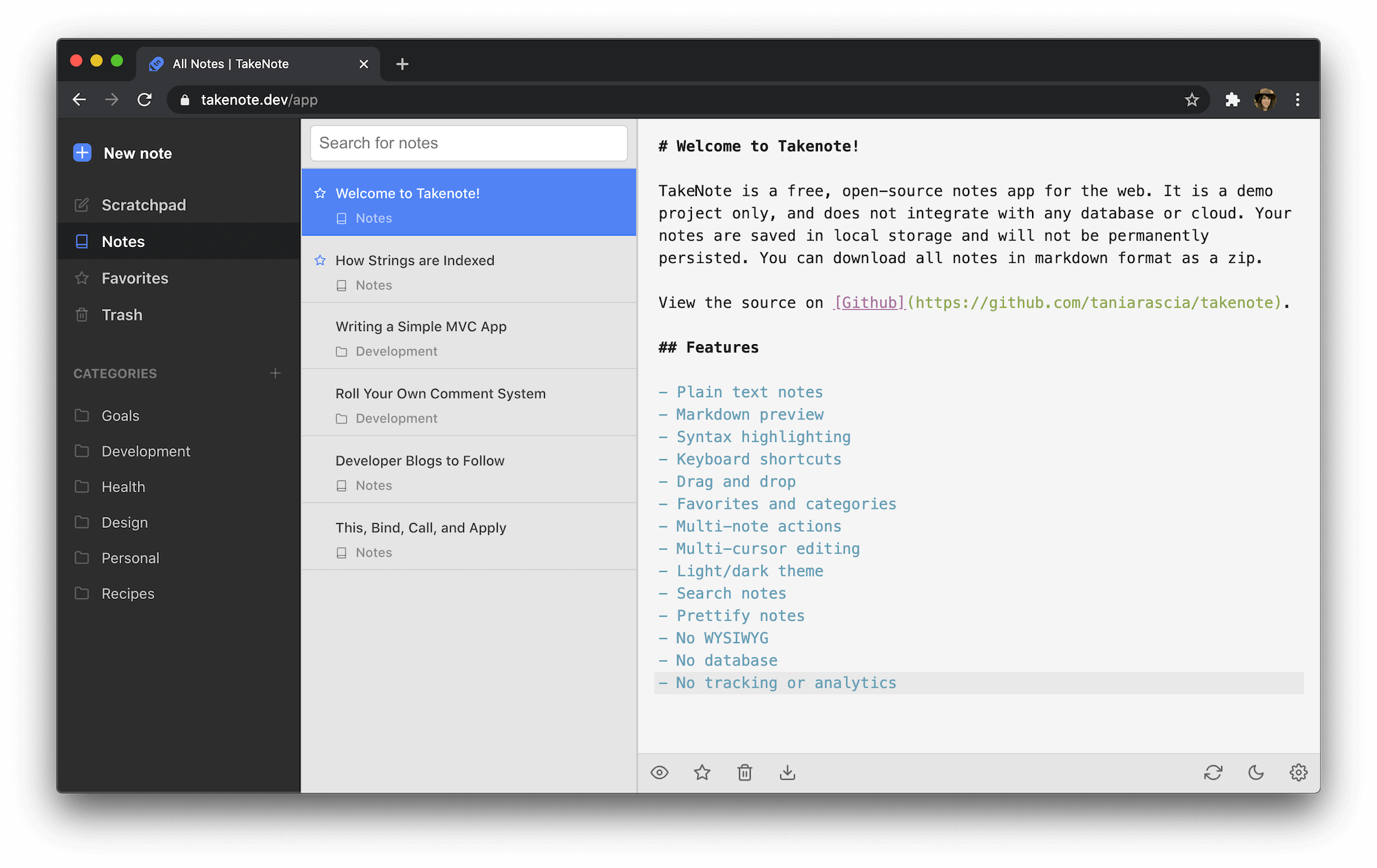
This is an amazing open-source web-based note taking apps for developers.
It enables developers to add notes in Markdown format, search note, classify and categorize their notes in unlimited categories.
Features
- Plain text notes - take notes in an IDE-like environment that makes no assumptions
- Markdown preview - view rendered HTML
- Linked notes - use
{{uuid}}syntax to link to notes within other notes - Syntax highlighting - light and dark mode available (based on the beautiful New Moon theme)
- Keyboard shortcuts - use the keyboard for all common tasks - creating notes and categories, toggling settings, and other options
- Drag and drop - drag a note or multiple notes to categories, favorites, or trash
- Multi-cursor editing - supports multiple cursors and other Codemirror options
- Search notes - easily search all notes, or notes within a category
- Prettify notes - use Prettier on the fly for your Markdown
- No WYSIWYG - made for developers, by developers
- No database - notes are only stored in the browser's local storage and are available for download and export to you alone
- No tracking or analytics - 'nuff said
- GitHub integration - self-hosted option is available for auto-syncing to a GitHub repository (not available in the demo)
5- Notesnook
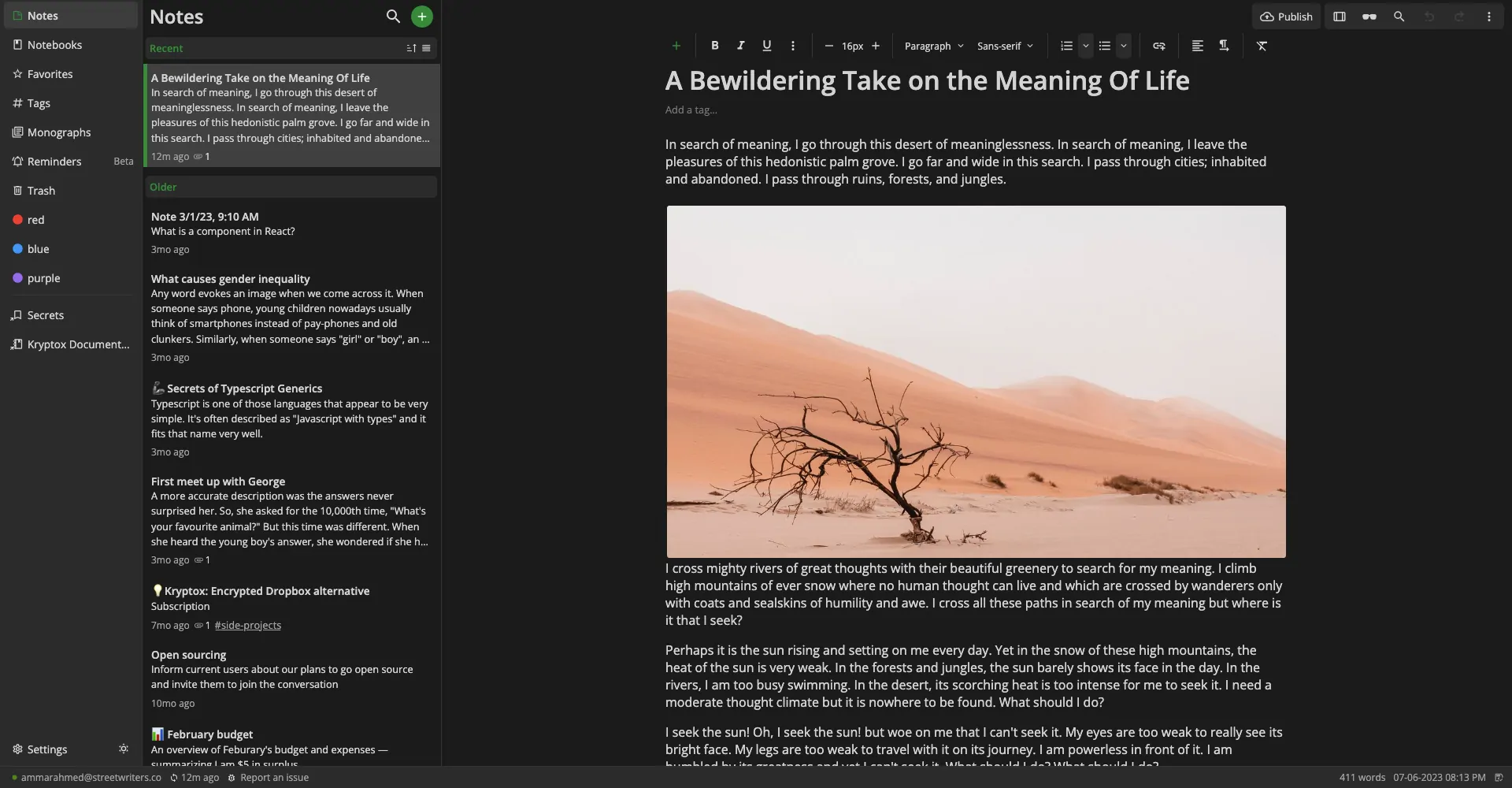
Notesnook is a free and open-source self-hosted collaborative note-taking app that prioritizes user privacy and ease of use. It encrypts data on the device using XChaCha20-Poly1305 and Argon2, ensuring zero knowledge principles.
The app aims to provide peace of mind and 100% confidence in the security of users' notes.

6- Benotes
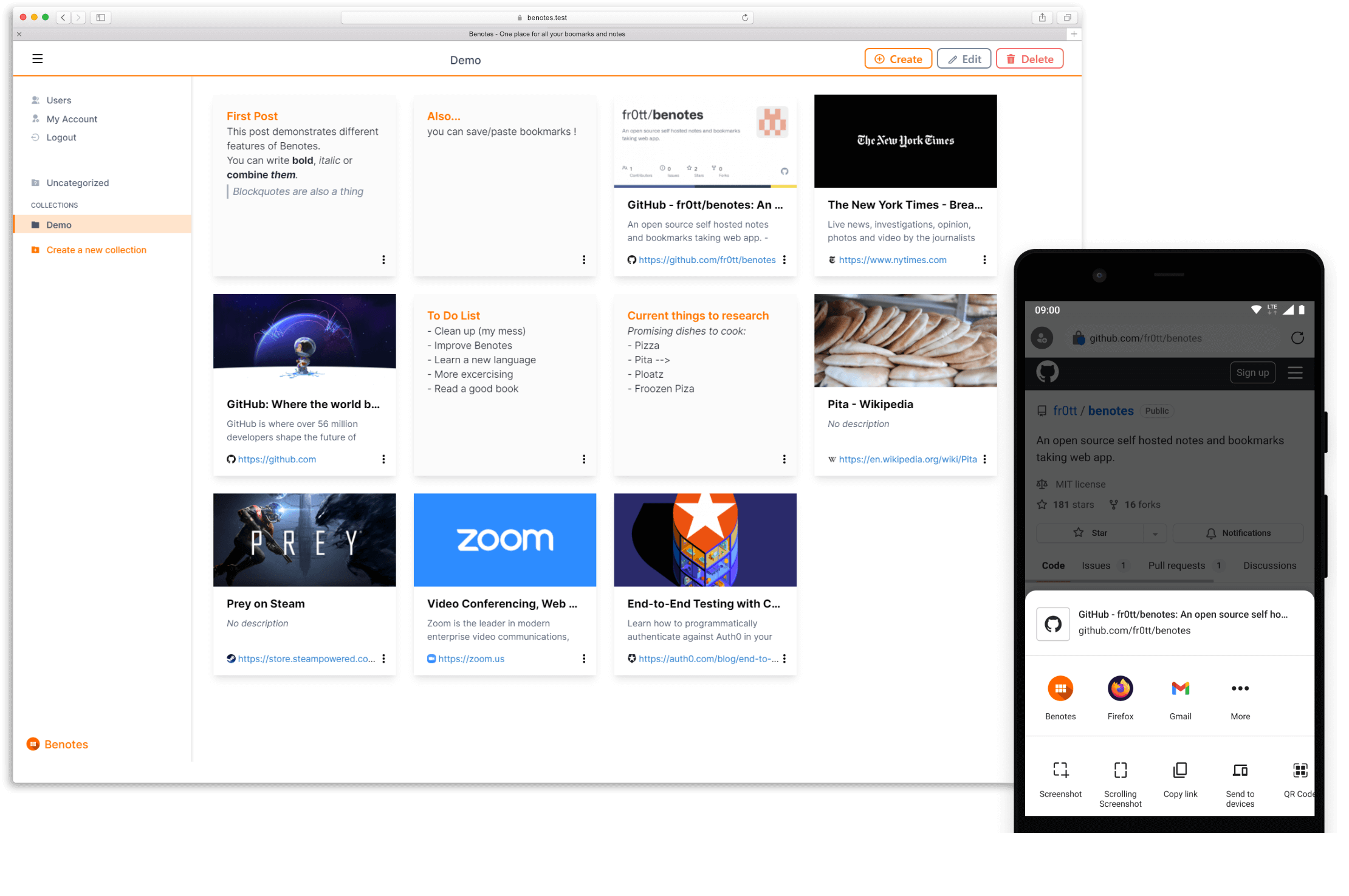
Benotes is an open-source self-hosted web app for organizing notes and bookmarks.
It supports automatic saving of URLs with image, title, and description, and offers both markdown and rich text editing.
It can be installed as a PWA on mobile and desktop devices, allowing for easy content sharing. Collections can also be shared via a public URL.

7- Flatnotes
Flatnotes is a free and open-source self-hosted, database-less note-taking web app that utilises a flat folder of markdown files for storage.
Features
- Mobile responsive web interface.
- Raw/ WYSIWYG Markdown editor modes.
- Advanced search functionality.
- Note "tagging" functionality.
- Wikilink support to easily link to other notes (
[[My Other Note]]). - Light/dark themes.
- Multiple authentication options (none, read-only, username/password, 2FA).
- Restful API.
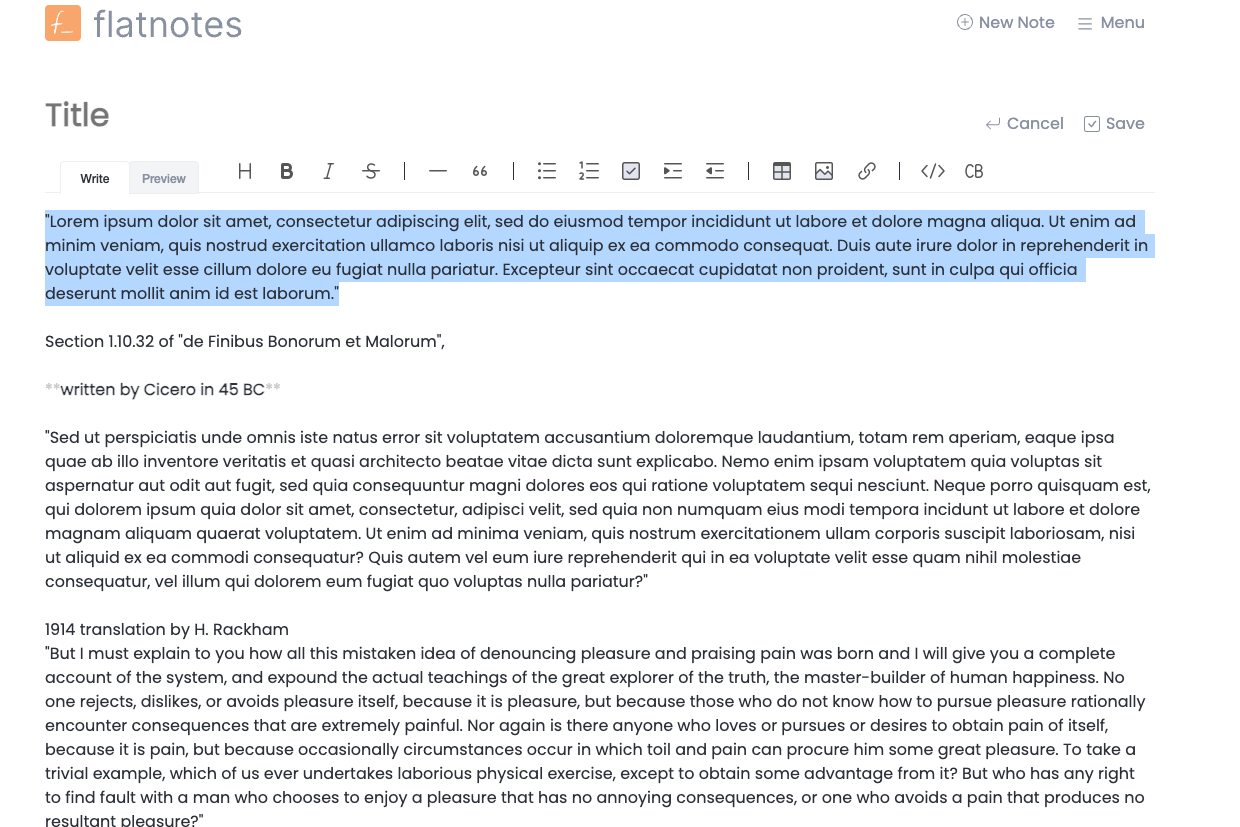
8- Rubium (Alpha)
Rubium is a Secure, Fast and open-source Note-taking app, an alternative to other ridiculously-expensive apps.
It uses Appwrite as a backend.
9- Notea
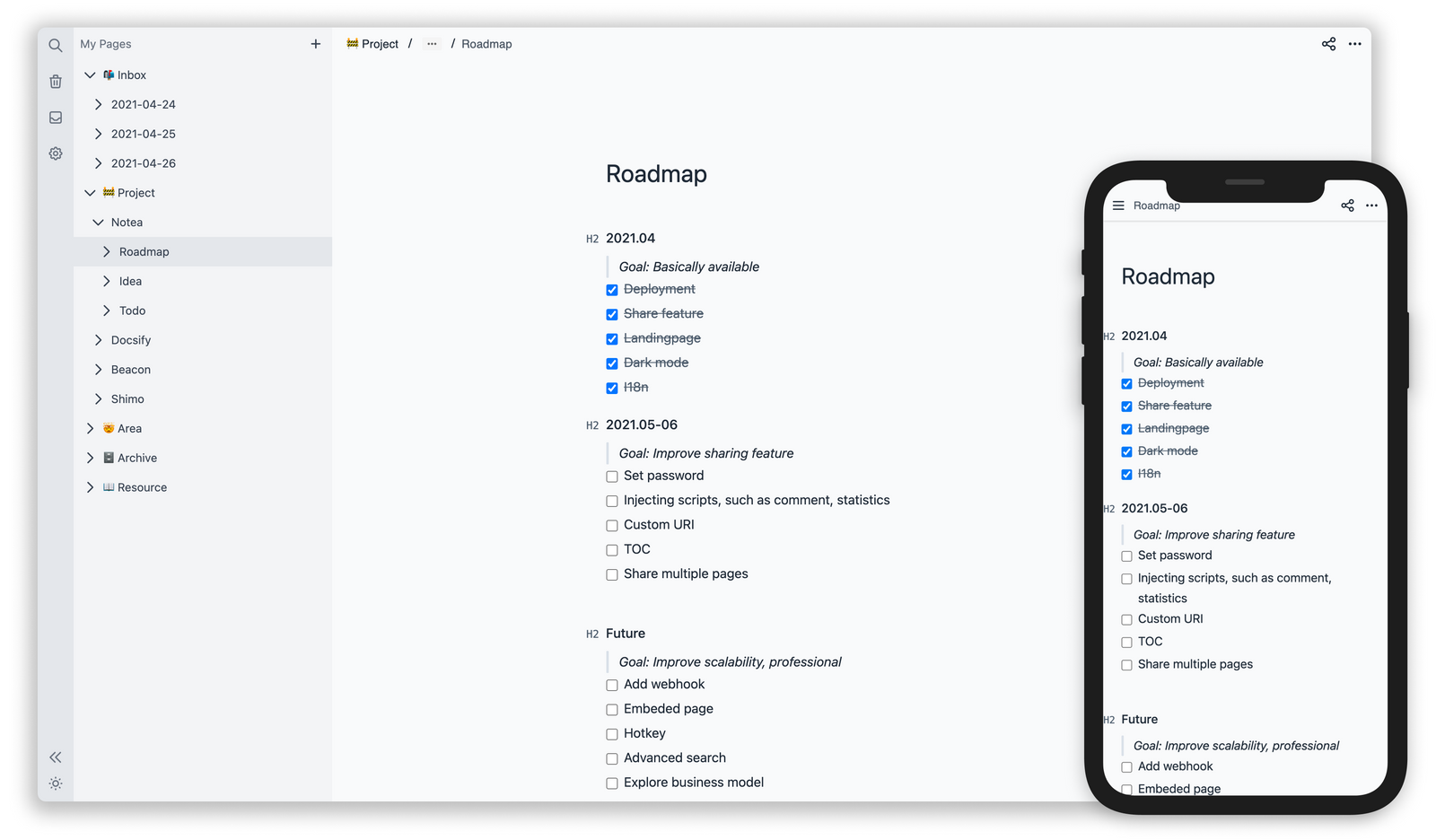
Notea is a free and open-source web-based note-taking app that you can deploy easily using Docker or on services like Netlify and Vercel.
It supports multiple platforms to store your note securely and support internal note links (backlinks).
Features
- One-click deploy to Vercel/ Netlify or deploy to host with Docker.
- Support storage in Amazon AWS S3, MinIO, Aliyun OSS, etc
- Notion-like Markdown editor
- Backlinks
10- Memos

Memos is a free privacy-first, lightweight note-taking service. Easily capture and share your great thoughts.
Key Features
- Open source and free forever. Embrace a future where creativity knows no boundaries with our open-source solution – free today, tomorrow, and always.
- Self-hosting with Docker in just seconds. Enjoy the flexibility, scalability, and ease of setup that Docker provides, allowing you to have full control over your data and privacy.
- Pure text with added Markdown support. Say goodbye to the overwhelming mental burden of rich formatting and embrace a minimalist approach.
- Customize and share your notes effortlessly. With our intuitive sharing features, you can easily collaborate and distribute your notes with others.
- RESTful API for third-party services. Embrace the power of integration and unleash new possibilities with our RESTful API support.

11- DeepNotes
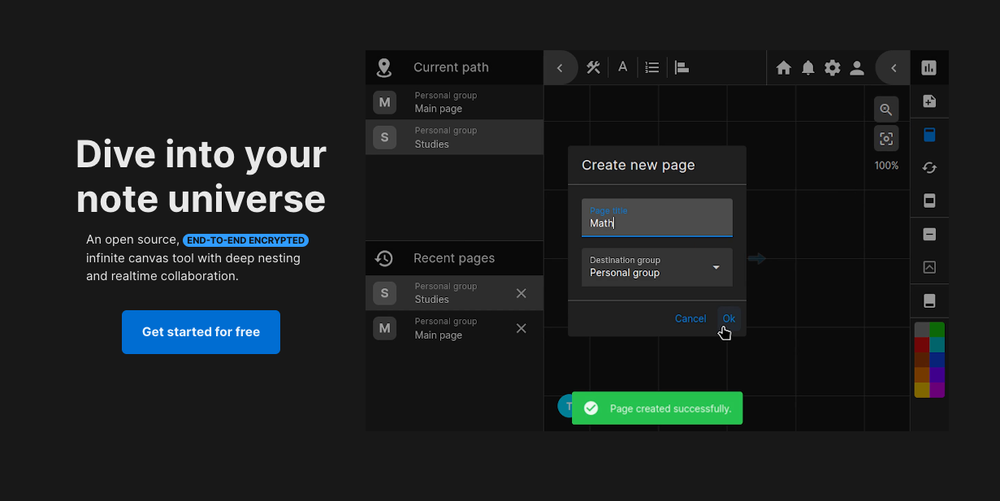
DeepNotes is an open source, end-to-end encrypted infinite canvas tool with deep page nesting and real time collaboration.
Key features
- Infinite canvases: Free yourself from the big wall of text.
- Deep page nesting: Explore concepts in all their complexity.
- End-to-end encryption: Keep your notes well protected.
- Real Time collaboration: Create groups to collaborate with your team.
- Flexible note system: Organize your notes in whatever way you want.
- Lifelong storage: Never lose your notes ever again.

12- Joplin
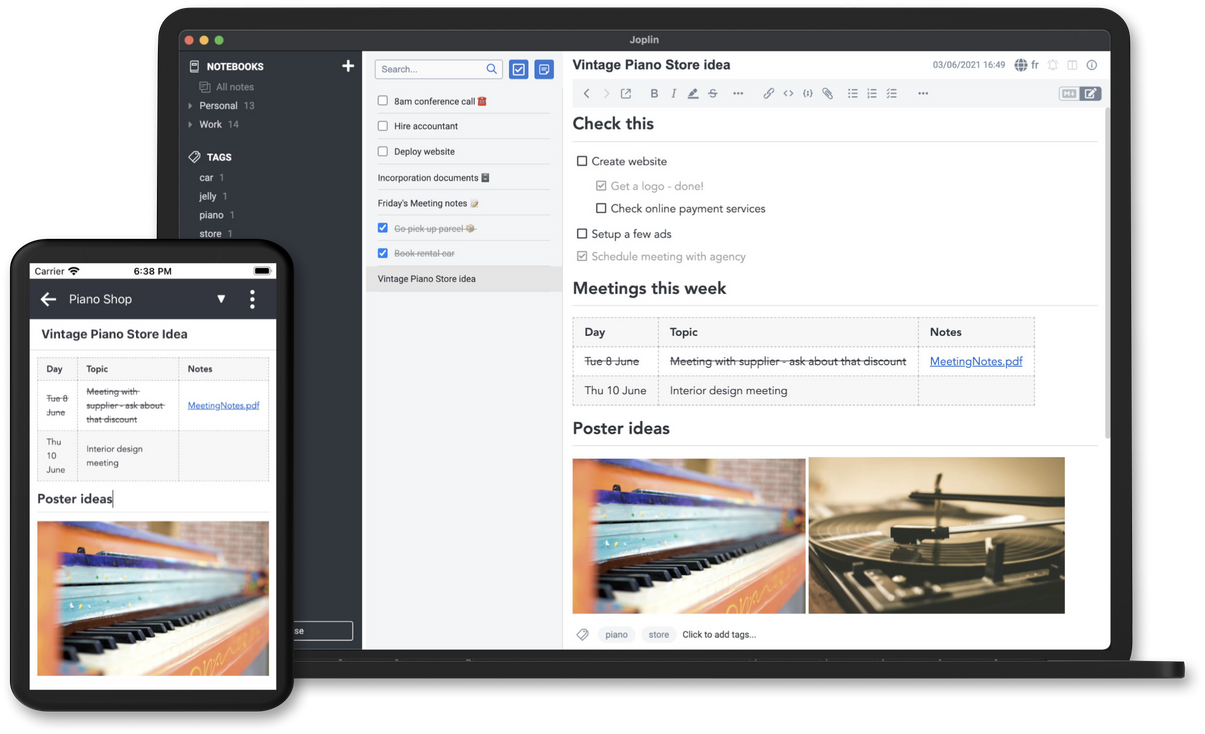
Joplin is an open-source note-taking app that allows you to capture your thoughts and securely access them from any device. It supports multimedia notes, collaboration, and web clipping, and offers customization through plugins and themes.
Notes can be synchronized across devices using Joplin Cloud, Dropbox, and OneDrive, ensuring access from your computer, phone, or tablet.
While it does not a self-hosted version, it supports synced notes using multiple backends.


13- OfflineNotepad
OfflineNotepad is an open-source, browser-based, offline-first notepad designed for secure, private note-taking. It encrypts data on both the client and server sides, focusing on minimalism and security.
The platform allows for notes to be published with a simple random link, supports markdown, and can be self-hosted by running its server through Docker or Go.
It's inspired by cowyo and rwtxt, aiming for a minimalist note-writing experience accessible anywhere
14- Laverna
Laverna is a privacy-focused, open-source markdown note-taking app. It allows users to write notes with a live markdown editor, support for tasks, code highlighting, and distraction-free mode.
Notes can be synchronized across devices using Dropbox & RemoteStorage, and it features no registration for anonymity. Encryption ensures privacy. The app is available for Linux, MacOS, Windows, and plans for an Android version are mentioned.

15- Fossil
Fossil is a distributed software configuration management system that includes project management tools such as distributed version control, bug tracking, wiki, forum, email alerts, chat, and technotes. Its built-in web interface is themeable, extensible, and intuitive, offering a variety of information pages to promote situational awareness.
The system is designed to be an all-in-one, self-contained executable, making it easy to self-host and efficient for project websites. It uses HTTPS for network communications and supports "autosync" mode to reduce forking and merging in projects.
The app can be used a self-hosted web-based note app, for teams.

16- SilverBullet
SilverBullet is a self-hosted collaborative note app that can be used as a simple note-taking application or as a powerful end-user programming tool.
It leverages metadata annotations, Objects infrastructure, Live Queries, and Live Templates to develop ad-hoc knowledge applications. It is implemented as an open-source, offline-capable web application.
17- Reor Project
The Reor Project is a self-hosted collaborative note app that connects related ideas, provides semantic search, and allows editing with an Obsidian-like markdown editor. It emphasizes running models locally and offers integration with OpenAI models.
Importing notes from other apps is possible by populating a chosen directory with markdown files. The project is licensed under GPL-3.0 and is available for download on Mac, Linux, and Windows.
18- Note Mark

Note Mark is a lighting fast and minimal; web-based Markdown notes app. Featuring a sleek and responsive web UI.
Features
- Markdown (GitHub Flavored Markdown, see spec here)
- HTML sanitisation, minimizing XSS attacks
- Mobile Friendly
- Friendly "Slug" based URLs for cleaner links
- Dark & Light Theme
- Notebook Sharing
- Custom flat-file based storage system
- Multiple views for a note (rendered, plain)
- Simple editor with shortcuts
- Upload and attach assets
19- Bloc-notes Bloc-notes is a free, open source and encrypted notebook.
Bloc-notes is a free, open source and encrypted notebook.
Features
- Free and open-source
- Encrypted notes with AES-256-GCM
- Save and edit notes
- Change note colors
- Copy and export notes
- Markdown and HTML5 support
- Create task lists, tables, links, and code blocks
- Search notes by title or add categories
- Sync notes between devices with secure database
- Make notes public and share via random URL
- No email required, only username and strong password
- Progressive Web App (PWA) with automatic updates
20- PenX
PenX is a structured note-taking app designed for personal use. In PenX, Privacy is first important thing. our mission is building a elegant tool to manage personal digital assets, like notes, tasks, ideas, password, documents.
Key Features
- Local-First - You own your data, in spite of the cloud
- Privacy-First - Use End-To-End Encryption to sync data
- Open Source - Trust our code, not our words
- Version control - GitHub-Based Version control Out-of-box
- Licensed under AGPL-3.0 License.
21- Sticky Notes

Sticky Notes is a web-based open-source note-taking app that is built using Django, Bootstrap CSS framework, and jQuery library.
It may look outdated but it is usable.
22- BatNoter
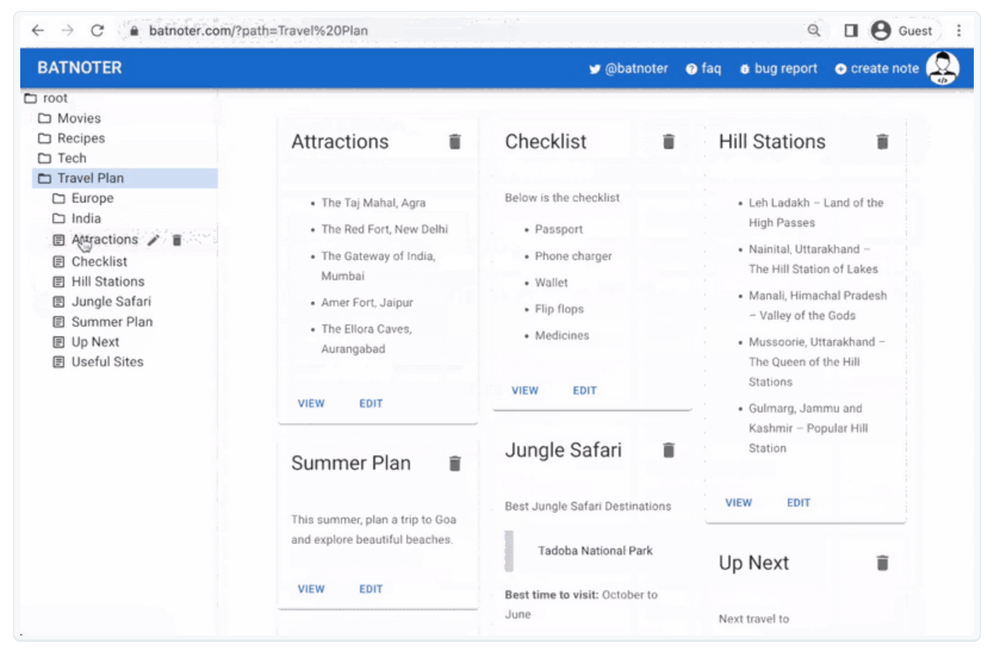
Batnoter is a self-hosted collaborative note-taking app designed for researchers and academics. It offers features such as easy organization of notes into notebooks, support for Markdown formatting, and the ability to attach files to notes.
The app also provides a search functionality to quickly find relevant notes and supports collaborative editing, allowing multiple users to work on the same notebook simultaneously.
batnoter aims to provide a seamless and efficient note-taking experience for users in the academic and research community.

23- Livebook
Livebook is an interactive notebook that allows you to write and run code in your web browser. It offers features such as real-time collaboration, code highlighting, and the ability to share notebooks with others.
Additionally, Livebook supports multiple programming languages, making it versatile for different use cases.
Key Features
- Code notebooks with Markdown support and Code cells for running Elixir code.
- Rich code editor using CodeMirror: with autocompletion, inline documentation, and code formatting.
- Interactive results via Kino: display Vega-Lite charts, tables, maps, and more.
- Automation: use Smart cells to perform tasks and write notebooks faster. Query databases, plot charts, build maps, and more directly from Livebook's UI.
- Reproducibility: Livebook ensures predictable code execution order, including package management. It also tracks notebook state, indicating stale parts.
- Collaboration: multiple users can work on the same notebook simultaneously, no additional setup required.
- Decentralized: Livebook is open-source and can be run anywhere. The "Run in Livebook" badge makes it easy to import any Livebook into your own Livebook.
- Versionable: notebooks are stored in the .livemd format, a subset of Markdown with support for diagrams using Mermaid and mathematical formulas using KaTex. .livemd files can be shared and work well with version control.
- Custom runtimes: when executing Elixir code, you can start a fresh Elixir instance, connect to an existing node, or run it inside an existing Elixir project with access to all modules and dependencies. Livebook can be a great tool for introspecting and documenting existing projects too.
24- Standard Note
Standard Notes is a secure, end-to-end encrypted notes app designed for privacy-focused users. It offers features like markdown support, tasks, code snippets, and secure file storage.
The platform is known for its strong emphasis on security, with audited encryption to protect data. It supports cross-platform syncing across unlimited devices and provides options for automated backups.
Key Features
- Markdown support
- Rich text Documents
- Task and todos
- Code snippets
- Secure file storage
- Journaling and diary

25- Turtl
Turtl is a secure, collaborative notebook designed to protect your data through high-end cryptography, allowing you to organize your life from bookmarks to passwords and files.
It supports syncing across devices, collaboration with teammates or family, and note-taking in Markdown format.
Turtl emphasizes privacy, offering the option to self-host your server. It is an open-source project, inviting community contributions and support through donations or opting for premium services.
However, make sure to keep your password secure and never forget it. If you do forget your password, it will be difficult to recover your notes.
Read More
